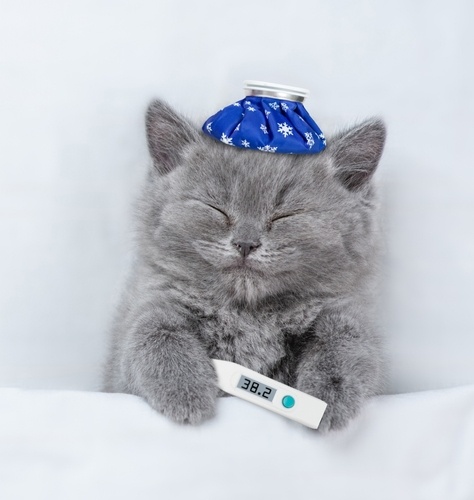- All products are added to your cart.
Cat disease
Feline Panleukopenia or Feline Panleukopenia Virus
Feline Panleukopenia, or Feline Panleukopenia Virus, is a highly contagious gastrointestinal disease in cats, leading to rapid mortality. The disease is caused by a virus, the feline panleukopenia virus, a type of parvovirus. The virus is 98% identical to the parvovirus found in dogs, and the symptoms are also similar. Fortunately, effective vaccination against feline panleukopenia is available.
Symptoms of feline panleukopenia include:
- Vomiting
- Diarrhea
- Dehydration
- Sudden death in (young) adult cats with symptoms resembling upper respiratory infections
- Abortions and brain damage in kittens
The severity of diarrhea can range from mild to severe, and in some cases, it can be fatal. Infections in pregnant cats can lead to abortion or brain damage in kittens. As the virus also attacks white blood cells, the immunity of cats with feline panleukopenia is compromised, making them susceptible to other viruses and bacteria. A simple test can detect the virus in the feces of infected animals. Due to the virus's resilience, it's crucial to perform this test in animals exhibiting symptoms consistent with feline panleukopenia.
Unfortunately, survival rates for this disease are low, with up to 90% of affected cats not surviving. Even if a cat survives, it can remain a carrier of the virus, shedding it in the environment and potentially infecting other cats.
If a kitten with diarrhea appears otherwise healthy, it likely doesn't have feline panleukopenia, and the diarrhea may be caused by another factor. In such cases, Zoolac ProPaste can offer a solution.
The virus can persist in the environment for an extended period and is resistant to most disinfectants. Even after a year, it can still lead to infection.
Disinfectants against the Parvovirus:
The feline panleukopenia virus is a resilient virus that can survive for months to years in a dark and humid environment. The virus can be transmitted through clothing and hands, so caregivers in quarantine should wear protective clothing (including gloves).
Only VirkonS and chlorine can effectively kill the virus. Alcohol and quaternary ammonium compounds are not effective disinfectants against feline panleukopenia.
VirkonS is particularly effective against the feline panleukopenia virus, killing it within 10 minutes at a concentration of 1% (1:100). VirkonS can be easily applied with a mop, cloth, sponge, or spray. It is ideal for one-step cleaning and disinfection of surfaces and equipment, floors, walls, cages, food and water bowls, and toys in catteries and kennels.
Chlorine is sensitive to organic pollution and loses its effectiveness almost immediately when in contact with feces, sand, or other visible dirt. If possible, it is always recommended to clean the spaces first.



